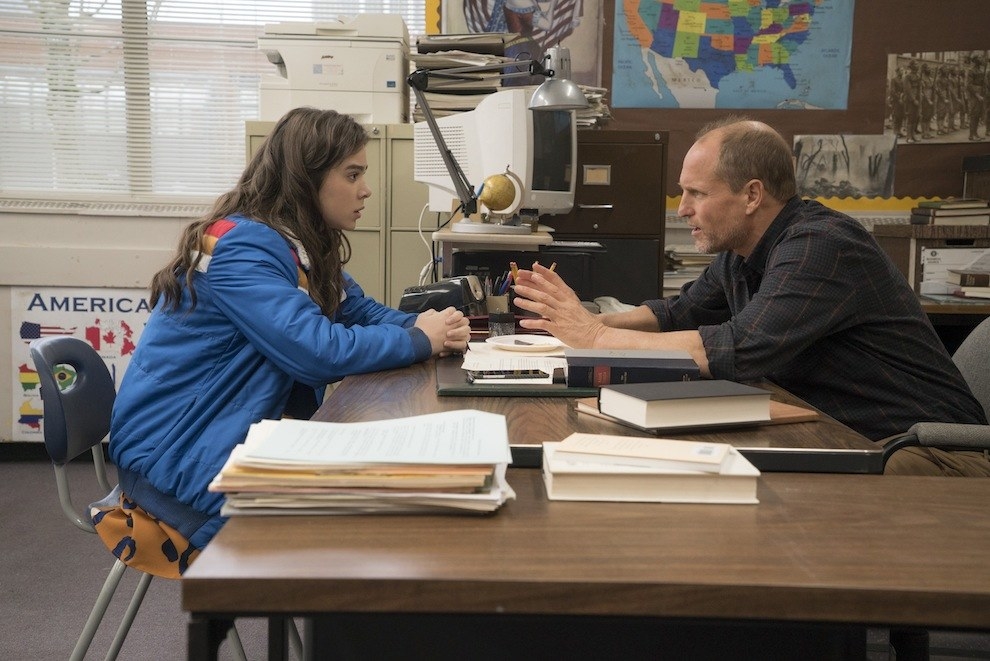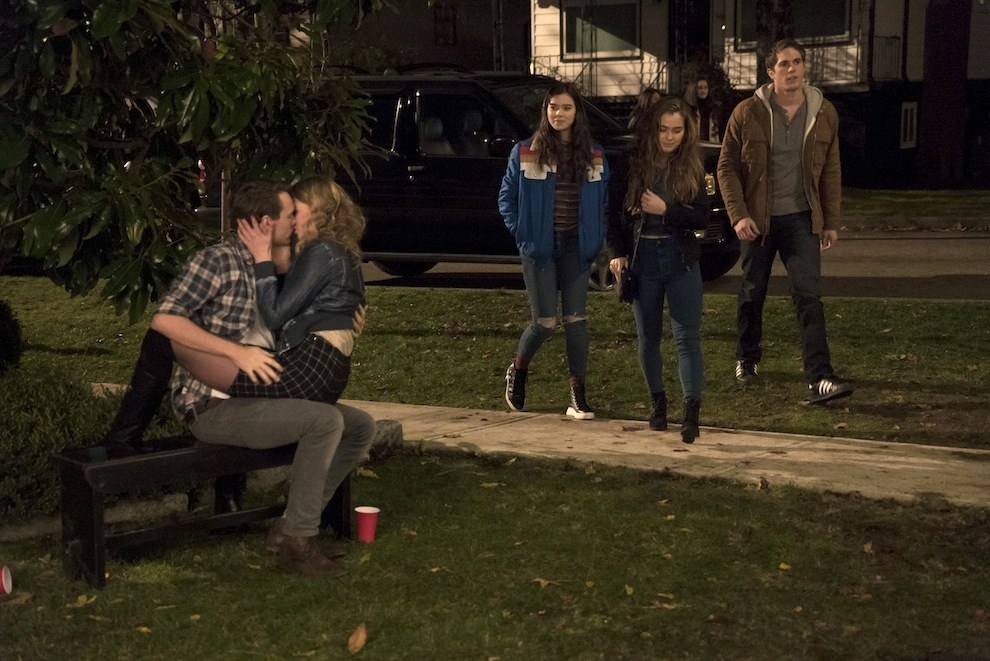
Nadine (Hailee Steinfeld) and Mr. Bruner (Woody Harrelson) in The Edge of Seventeen. Courtesy of STX Entertainment
When you’re 17 years old, everything feels like the end of the world. Anyone who survived high school can attest to this universal truth, which is also evident in the very first minute of The Edge of Seventeen, when Nadine — the film’s main character, played by Hailee Steinfeld — delivers the following epic monologue.
“Look, I don’t want to take up a ton of your time, but I’m gonna kill myself,” she says bluntly to her teacher, Mr. Bruner (Woody Harrelson) after bursting into his empty classroom during a lunch break. “I just thought that someone should know.” Mr. Bruner, who’d been reading alone at his desk, gently puts his book down as if to calmly approach the storm ahead of him. “I don’t really know how this works. I’m probably going to jump off an overpass in front of a semi, or a U-Haul maybe, just not a bus. I’m not going to be a dick and make people watch. But it has to be big; it’s gotta be so big that it’s just, done. Kills me. Lights out,” Nadine rambles. She continues on for a while longer, eventually getting a less-than-desired response from Mr. Bruner: He picks up a random piece of paper on his desk and sarcastically recites his own fake suicide note, just to bring attention to her dramatics.
Later on in the film, we find out that Nadine’s outburst was inspired by a Facebook message she accidentally sent to her unrequited crush (who doesn’t know she exists). “Highly embarrassing” doesn’t even begin to describe the contents of the message, which includes the sentences “I want you to put your mouth on my tits” and “We can do it in the Petland stockroom,” for example.
While those kind of teen moments are often dismissed as overly emotional and irrational, The Edge of Seventeen writer and director Kelly Fremon Craig thinks it’s important to acknowledge that “those problems are real problems.”
“At that age, everything that you feel is enormous,” Fremon Craig told BuzzFeed News in a phone interview in October. “The highs are so high and the lows are so low, and in a way I think you’re never quite so alive in your life because you’re feeling everything so deeply.”
But the writer/director also said she didn’t “want to neglect the absurdity” that occurs when you’re a teen — like threatening suicide during a long-winded diatribe because you accidentally told your crush you like them. Instead of diminishing those very real feelings, Fremon Craig wanted to honor the authenticity of the teenage experience.
“At the root of them, I think, are the same issues that anyone can have at any age, which is that feeling of being all alone in your pain,” Fremon Craig said. “[You don’t think] anybody feels how bad you feel. You don’t think anyone gets it.”
In The Edge of Seventeen, which is now in theaters, Nadine is grappling with a lot: Not only does her best and only friend fall for her cool older brother with whom she has a less than stellar relationship, but she’s also dealing with the unexpected death of her father and a tumultuous dynamic with her mom. Life is challenging enough when you’re a high schooler dealing with poorly timed pimples and unfortunately awkward haircuts, but these circumstances make Nadine’s existence increasingly difficult.
During a phone interview, 19-year-old Steinfeld described one’s teenage years to BuzzFeed News as “our time to figure out who we are and what we’re good at, what we want to do when we grow up, how we’re supposed to fit in, and what we have to do to fit in.” She agreed that — regardless of Nadine’s uniquely burdensome experiences — being a teenager is hard for anyone.
“That’s when we have to answer all those questions for ourselves, and a lot of people have people around them to help answer and some people don’t,” Steinfeld continued. “This character has nobody.”
Everything is simultaneously awesome and terrible when you’re going through this period of your life. Being a teenager is peak feelings; unfortunate experiences feel like the worst days you’ll ever see, and the slightly positive moments mask themselves as euphoria. Fremon Craig noted that this is partially because you’re experiencing so many monumental rites of passage for the first time. Heartbreak gets easier the second (and third, and fourth) time around, as do friendship-related conflicts, and mixed outcomes when it comes to schoolwork or a job.
But the first time any of those things happen? It might as well be the end of the world. It’s nearly impossible to see the other side of the tunnel if you have yet to experience what it takes to actually get there. And that validates every teenager’s feelings even more.
Nadine (left) walking by another couple on her way to a high school party. Courtesy of STX Entertainment
When Nadine’s crush does reply to her embarrassing Facebook message, he doesn’t reject her or make her feel even more embarrassed than she already does. Instead, he asks her to hang out, and it’s like nothing better has ever happened in the entirety of Nadine’s life. She blasts music at the absolute highest volume as she completely tears her room apart looking for the perfect outfit that will surely leave an impression. To 17-year-old Nadine, it’s more than just a Facebook reply; it’s the thing she’s been wanting from the person she’s been pining over. Her suicide monologue instantly becomes a distant memory. Her world is no longer over, because this is the best moment of her life.
Everything at 17 seems to matter: every conversation, facial expression, text message, lack of text message, fight with a friend, and grade on a paper. Every smile and every tear shed matters because they’re your feelings.
“The reason things are so tough at that age is because you’re dealing with adult things for the first time. Rejection, loneliness, or [questions of] ‘Who am I? Where do I belong? Will anybody actually get me? Am I weird? Will anyone love me?’” Fremon Craig said. “Everything is more heightened.”
This fall, the writer/director went back and read all of her old diary entries from when she was 17. As it turns out, she was pleasantly surprised at her findings.
“When I started, I was like, Oh, this is going to be amusing. And then I went, ‘Holy shit, I knew more at that point than I thought I did,’” Fremon Craig said. “I was actually dealing with real things and figuring stuff out. It was a big mess, and in a lot of ways it’s not that different from life now.”



